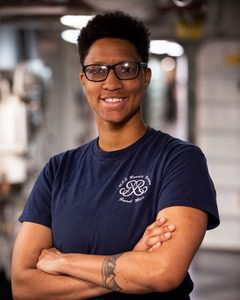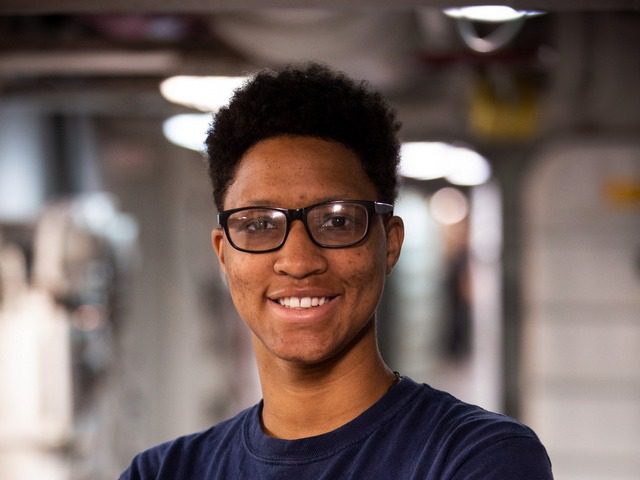
(Photo by Senior Chief Mass Communication Specialist Gary Ward)
Seaman Shari Occeant, a native of Miami, joined the Navy to do something good in her life and be a positive role model to others.
Now, one year later and half a world away, Occeant serves aboard the aircraft carrier USS Ronald Reagan, patrolling one of the world’s busiest maritime regions as part of the leading-edge of U.S. Seventh Fleet.
“This ship is a city on an ocean; at first it was intimidating, but once you learn the ship you feel a little bit of ownership,” Occeant said. “It feels like a home to me.”
Occeant, a 2016 graduate of North Miami Beach Senior High School, is a culinary specialist aboard the Yokosuka, Japan-based ship, the only forward-deployed aircraft carrier in the Navy.
A Navy culinary specialist provides well-balanced meals for the entire crew on the ship.
Occeant credits success in the Navy to many of the lessons learned in Miami.
“My mom would always tell me to be proud of what you do, to always do your best and put 100 percent into everything that you do,” Occeant said.
U.S. Seventh Fleet spans more than 124 million square kilometers, stretching from the International Date Line to the India/Pakistan border; and from the Kuril Islands in the north to the Antarctic in the south. U.S. Seventh Fleet’s area of operations encompasses 36 maritime countries and 50 percent of the world’s population with between 50-70 U.S. ships and submarines, 140 aircraft, and approximately 20,000 sailors.
“No matter what I do on this ship or where I go in Japan, it’s always different to me,” Occeant said. “It’s exciting to know I can just go out and experience something new every day.”
With more than 50 percent of the world’s shipping tonnage and a third of the world’s crude oil passing through the region, the United States has historic and enduring interests in this part of the world. The Navy’s presence in Yokosuka is part of that long-standing commitment, explained Navy officials.
“The Navy is forward-deployed to provide security and strengthen relationships in a free and open Indo-Pacific. It’s not just the ships and aircraft that have shown up to prevent conflict and promote peace,” said Vice Adm. Phil Sawyer, commander, U.S. Seventh Fleet. ‘It is, and will continue to be, our people who define the role our Navy plays around the world. People who’ve made a choice, and have the will and strength of character to make a difference.”
Named in honor of former President Ronald Reagan, the carrier is longer than three football fields, measuring nearly 1,100 feet.
The ship, a true floating city, weighs more than 100,000 tons and has a flight deck that is 252 feet wide. Two nuclear reactors can push the ship through the water at more than 35 mph.
Sailors’ jobs are highly varied aboard the carrier. Approximately 3,200 men and women make up the ship’s crew, which keeps all parts of the aircraft carrier running smoothly. This includes everything from handling weapons to operating nuclear reactors.
Another 2,500 men and women form the air wing responsible for flying and maintaining more than 70 aircraft aboard the ship.
The USS Ronald Reagan, like each of the Navy’s aircraft carriers, is designed for a 50-year service life. When the air wing is embarked, the ship carries more than 70 attack jets, helicopters and other aircraft, all of which take off from and land aboard the carrier at sea.
Serving in the Navy means Occeant is part of a world that is taking on new importance in America’s focus on rebuilding military readiness, strengthening alliances and reforming business practices in support of the National Defense Strategy.
A key element of the Navy the nation needs is tied to the fact that America is a maritime nation, and that the nation’s prosperity depends on the ability to operate freely on the world’s oceans. More than 70 percent of the Earth’s surface is covered by water; 80 percent of the world’s population lives close to a coast; and 90 percent of all global trade by volume travels by sea.
“Our priorities center on people, capabilities and processes, and will be achieved by our focus on speed, value, results and partnerships,” said Secretary of the Navy Richard V. Spencer. “Readiness, lethality and modernization are the requirements driving these priorities.”
Though there are many ways for sailors to earn distinction in their command, community, and career, Occeant is most proud of graduating the Navy’s boot camp.
“The military was something that I always wanted to do,” she said. “It was always a goal of mine, so to finish boot camp was an achievement for me.”
As a member of one of the U.S. Navy’s most relied upon assets, Occeant and other Sailors know they are part of a legacy that will last beyond their lifetimes contributing to the Navy the nation needs.
“I feel proud serving in the Navy,” Occeant said. “Being able to look back and say that I did something that not a lot of people get to do.”






